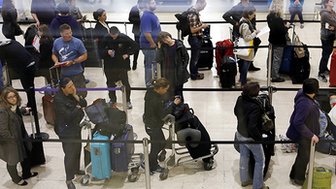G20 backs plan to stop global tax avoidance and evasion
The head of the IMF, Christine Lagarde, said the agreement was a positive step for all of the countries involved
Finance ministers from the G20 group of leading nations have formally backed plans to tackle international tax avoidance and evasion.
A statement issued earlier supports the automatic exchange of tax information between countries.
It also backs plans by the Organisation for Economic Cooperation and Development to stop firms moving their profits across borders to avoid taxes.
The OECD said some firms "abuse" current rules to avoid tax.
UK Chancellor George Osborne said the announcement, which came after a two-day G20 meeting in Moscow, was an "important step towards a global tax system that is fair and fit for purpose for the modern economy".
'Aggressive tax avoidance'Last month, the G8 group of leading economies agreed a deal to "fight the scourge of tax evasion", and nations including the UK, France, Germany, the USA and Australia are taking part in a pilot information exchange scheme.
Analysis
The banking crisis may be abating but the perception that the current global tax system encourages or enables highly profitable firms to pay little or no tax on their profits is like a festering sore among many electorates.
George Osborne knows he would have a problem in the 2015 election if the UK public thinks that his party - traditional allies of big business - will tolerate aggressive tax avoidance while cutting living standards for ordinary taxpayers.
So Mr Osborne, who did not have a great 2012 - remember the booing at the Olympics - has just had a good week by persuading the rest of the emerging economic world to sign up to the OECD plans to clamp down on aggressive tax management.
His month could get even better at the end of next week if UK growth is shown to have accelerated.
British Prime Minister David Cameron made the issue a priority for the UK's presidency of the G8 this year, and Australia has agreed to do the same during its G20 presidency next year.
The OECD said current tax rules, some dating to the 1920s, were created to avoid "double taxation" of companies working in more than one country - but it said they were being abused to allow "double non-taxation".
BBC business correspondent Joe Lynam said the "bandwagon of clamping down on aggressive tax avoidance" was moving on from developed economies to emerging ones like Brazil and India.
The rules should mean bigger bills for companies which could previously "pit one country off against another in terms of tax", our correspondent added.
The G20 asked the OECD to come up with a plan to improve tax cooperation, and the finance ministers said they "fully endorse the OECD proposal for a truly global model" of information sharing.
Their statement called on all countries to make automatic information sharing a reality "without further delay", adding that "capacity-building support" would be provided for poorer nations.
Closing loopholesThe G20 said the changes should be in place within two years, but our correspondent called that "very ambitious" because hundreds of tax treaties exist between countries and "thousands of amendments" might be needed.
Many multinational firms currently avoid tax - legally - by means including loopholes and tax havens, but the new rules could require them to pay more in the countries where they do business.
Firms including Google, Starbucks, Amazon and Apple have been criticised for the amount of tax they pay.
Earlier this year, MPs attacked Google for routing £3.2bn of UK sales through Dublin and paying little tax as a result.
Starbucks has been questioned for transferring money to a Dutch sister company in royalty payments, though the firm agreed to pay more tax after strong public criticism.
The companies point out that these schemes are legal and they have a duty to shareholders to minimise their tax bills.



 Online pornography 'to be blocked'
Online pornography 'to be blocked' Japan PM Abe hails poll victory
Japan PM Abe hails poll victory The other Detroits
The other Detroits Stuck at work
Stuck at work Friends forever
Friends forever Feisty feeling
Feisty feeling Not the cheap seats
Not the cheap seats Fast Track
Fast Track